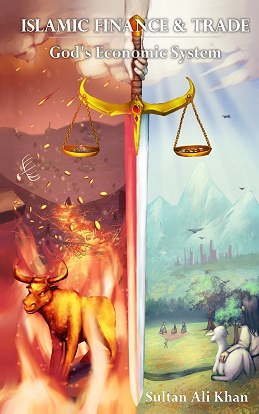





A Word From The Author
The combination of modern academic knowledge, practical experience and research of the Quran and Hadith have allowed Sultan to attain a special level of expertise in Islamic Finance, Trade & Economics.
Sultan Ali Khan




Review 1

Taskeen Adeeba
(Rating 4/5) Ordered this for my husband. He liked the depth and coverage from all 3 Abrahamic religions. To paraphrase : he found some nuggets of information about trade rules which Muslims seem to have lost somewhere along the way as well as examples of un-Islamic business practices prevalent today such as pre-Sales events. These events invite a select few to partake in business transactions prior to opening the market to the public. subsequently the market prices rise due to shortage and the common man comes out the loser. The property sales and commodities trading prevalent today is a perfect example of this practice. Another good lesson is about 'Cutting out the middle man'. A farmer / producer should have equal and unfettered access to sell in the market directly if they wish to do so. Unfortunately, this middleman practices are prevalent in our current business which produce mafia like cartels and eventually squeezes out the poor farmer. Overall a good factual collation of hadith, observation and analysis with some wonderful forgotten gems woven in.
Review 2

Khalid Umer
(Rating 5/5) Perfect guidance of Islamic banking . Thanks to Mr sultan
Review 3

Mr. Mohammed Muslehuddin Musab
Islamic Finance & Trade: God's Economic System by Sultan Ali Khan presents a comprehensive dossier of evidence on the fundamental principles of trade as found in the Abrahamic religions, with particular emphasis on Islam. Drawing upon his multi-religious and multicultural background, the author succeeds in establishing clear and logicall connections between the economic teachings of different religious traditions, specifically regarding trade and finance. One of the most notable aspects of the book is its focus on the moral and ethical guidelines within Islamic teachings on trade and finance. The author thoughtfully annotates these principles with references to Qur'anic texts and Hadith compilations, offering a rich blend of theoretical insight supported by authentic religious sources. This approach is among the many merits of the book, as it not only elucidates key religious principles but also bridges the gap between spiritual teachings and practical financial considerations. The structure of the book is designed to be accessible and beneficial to a diverse readership. Each subsection in section 5, the core of the book, is prefaced with a concise outline of the topics covered, making it equally useful for both seasoned experts and beginners in the field of Islamic economics and finance. Furthermore, the incorporation of case studies provides a real-world context to the ideas discussed, demonstrating the continued relevance of religious teachings to modern-day trade and finance practices. While some specialists in the field may find points for debate within certain arguments, the book undeniably holds value as a reference for students, practitioners, and researchers within the Islamic finance fraternity. The author’s blend of academic rigor and professional experience is evident throughout the text, making this work a worthy addition to the body of literature on Islamic economics. In conclusion, I commend Mr. Sultan Ali Khan for his scholarly contribution and strongly recommend the book "Islamic Finance & Trade: God's Economic System" as an essential addition to the libraries of educational institutions, professional offices, and individuals with an interest in Islamic finance. This book serves not only as a valuable resource for understanding the foundational aspects of trade in Islamic law but also as an insightful guide for applying these principles in the modern world. *It's a must read research paper for the students.* Mr. Mohammed Muslehuddin Musab is a seasoned expert in Islamic finance, Shari’ah compliance, and regulatory technology, with over a decade of experience in scientific research, professional training, editing, and auditing. He currently contributes to the field as a PhD candidate in Islamic Finance and Economy at Hamad Bin Khalifa University and holds an MSc in Islamic Finance from the same institution. His work with Bait Al-Mashura includes roles as Shari'ah Auditor and Editor for the Bait Al-Mashura International Scientific Journal, where he has been instrumental in shaping Islamic finance scholarship. Mr. Muslehuddin has published extensively on topics like RegTech, Blockchain, and Shari’ah governance, presenting his research at conferences internationally. His research interests span Islamic jurisprudence, financial technologies, and the practical application of Shari’ah in the financial sector. He also provides training to top management in Islamic banking, contributing significantly to the advancement of Shari'ah-compliant financial practices. Fluent in Arabic, English, and experienced in translation, Mr. Muslehuddin's contributions to the field are recognized both within Qatar and globally.
Review 4

Reader 4
Review on Islamic Finance & Trade


